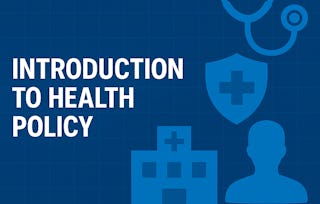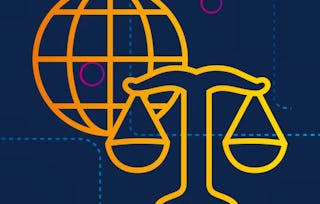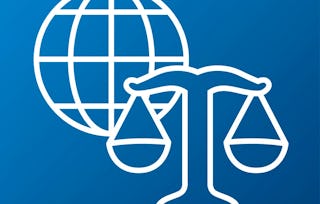In this course, learners will become familiar with principles and theories of global health problems, and major challenges and controversies in improving global population health as well as practical applications of quantitative methods to analyze and interpret issues and challenges for policy. Topics will include health and foreign policy, health governance, acute disease surveillance, non-communicable diseases, burden of disease, universal health coverage, health systems strengthening, health financing, and human resources for health and ageing.

Gain next-level skills with Coursera Plus for $199 (regularly $399). Save now.

(291 reviews)
What you'll learn
Summarize key issues and challenges in global health policy and governance
Explain double burden of disease and its impact on health systems
Apply core elements of universal health coverage within the context of ageing societies
Skills you'll gain
Details to know

Add to your LinkedIn profile
21 assignments
See how employees at top companies are mastering in-demand skills

There are 4 modules in this course
There are four modules in this lecture series. We will start with key issues in current global health policy and governance. The year 2015 reminded political leaders and the public that people’s safety is a genuine challenge at a time of disease epidemics, terrorism, refugee and migration crises, and climate change among others. The recent Ebola virus outbreaks in west Africa exposed weaknesses in core global functions, such as the provision of global public goods, management of cross-boarder externalities and fostering of leadership and stewardship. This module describes major challenges and issues in global health policy and proposes actions in global health, in particular for Japan at the G7 Ise-Shima Summit.
What's included
9 videos1 reading4 assignments
In this module, we will explore the relationship between universal health coverage, disasters and pandemics. We will learn how to measure and understand the spread of infectious diseases, and how to respond to them. We will also consider the conditions necessary to ensure an effective and timely response to both infectious disease emergencies and disasters, and identify the common role that universal health coverage plays in preparing societies for these unexpected threats to human well-being.
What's included
11 videos7 assignments
In Module 3, we will introduce the basic concept of universal health coverage (UHC), some technical aspects of health financing, and methods for measuring and improving UHC systems. We will also discuss the challenges to UHC posed by aging and development, including for developing countries. Finally, we will explore policy solutions to aging, and look at new policies being used around the world to improve and strengthen UHC systems.
What's included
9 videos6 assignments
One of the central themes in today’s global health policy is the achievement of universal health coverage (UHC). The recent Ebola crisis has indicated that not only responses, but preparedness is key to tackling health emergencies. There is a growing consensus that a set of low-cost, smart investments at country level has the potential to make a significant difference in building resilient health systems. Japan achieved UHC in 1961 at a time of rapid economic development, while the country was still relatively poor. Japan has achieved some of the best population health outcomes at relatively low cost with equity over half a century. However, Japan is facing a huge demographic and fiscal challenge to sustain its health system. In this module, we will review the historical context for Japan’s health system development, examine current challenges to its sustainability, and examine ongoing efforts to reform the system. The major objective is to share important lessons in current debates on global health policy and governance from Japan’s experiences.
What's included
8 videos4 assignments
Instructors

Offered by
Explore more from Public Health
 Status: Preview
Status: PreviewO.P. Jindal Global University
 Status: Preview
Status: PreviewUniversity of Geneva
 Status: Free Trial
Status: Free TrialImperial College London
 Status: Free Trial
Status: Free TrialImperial College London
Why people choose Coursera for their career




Learner reviews
291 reviews
- 5 stars
75.60%
- 4 stars
17.86%
- 3 stars
4.81%
- 2 stars
1.37%
- 1 star
0.34%
Showing 3 of 291
Reviewed on May 30, 2020
Insightful information on Japan's health system and approach compared to other countries.
Reviewed on Jul 16, 2020
I am glad I enrolled for this certificate course, learnt a lot of new things and also broaden my knowledge on what I knew before. the covid19 pandemic lockdown was put to use.
Reviewed on Dec 22, 2020
Well designed and insightful course. I learned a lot from this. Thanks a ton to the professors/instructors responsible !
Frequently asked questions
To access the course materials, assignments and to earn a Certificate, you will need to purchase the Certificate experience when you enroll in a course. You can try a Free Trial instead, or apply for Financial Aid. The course may offer 'Full Course, No Certificate' instead. This option lets you see all course materials, submit required assessments, and get a final grade. This also means that you will not be able to purchase a Certificate experience.
When you purchase a Certificate you get access to all course materials, including graded assignments. Upon completing the course, your electronic Certificate will be added to your Accomplishments page - from there, you can print your Certificate or add it to your LinkedIn profile.
Yes. In select learning programs, you can apply for financial aid or a scholarship if you can’t afford the enrollment fee. If fin aid or scholarship is available for your learning program selection, you’ll find a link to apply on the description page.
More questions
Financial aid available,







